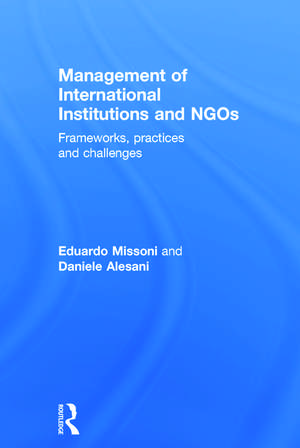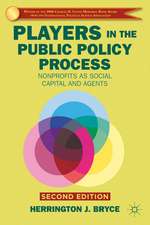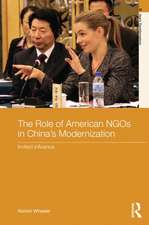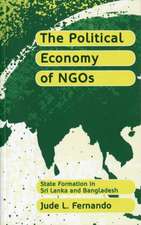Management of International Institutions and NGOs: Frameworks, practices and challenges
Autor Eduardo Missoni, Daniele Alesanien Limba Engleză Hardback – 12 dec 2013
Covering an admirably broad canvas, the authors pursue two main objectives. Firstly, they explore the main management frameworks developed in the context of the corporate and national public/non-profit organizations and adapt them to the specificity of IIs and INGOs. This leads to the identification of a "tailored" approach to IO management based on their institutional and operational settings, stakeholder groups, core business, staff profile, and financial arrangements. Secondly, they "bring theory into practice" by linking frameworks to several case studies and best practices of organizations currently experimenting with management systems and tools, with case studies including the World Bank and the Gates Foundation.
This comprehensive textbook is a must-own resource for students and academics involved with studying and working with international organizations.
| Toate formatele și edițiile | Preț | Express |
|---|---|---|
| Paperback (2) | 443.67 lei 6-8 săpt. | |
| Taylor & Francis – 31 aug 2023 | 443.67 lei 6-8 săpt. | |
| Taylor & Francis – 11 dec 2013 | 470.05 lei 6-8 săpt. | |
| Hardback (2) | 1231.38 lei 6-8 săpt. | |
| Taylor & Francis – 12 dec 2013 | 1231.38 lei 6-8 săpt. | |
| Taylor & Francis – 31 aug 2023 | 1407.97 lei 6-8 săpt. |
Preț: 1231.38 lei
Preț vechi: 1501.68 lei
-18% Nou
Puncte Express: 1847
Preț estimativ în valută:
235.61€ • 246.03$ • 194.57£
235.61€ • 246.03$ • 194.57£
Carte tipărită la comandă
Livrare economică 15-29 aprilie
Preluare comenzi: 021 569.72.76
Specificații
ISBN-13: 9780415706643
ISBN-10: 0415706645
Pagini: 440
Ilustrații: 69 b/w images, 25 tables and 69 line drawings
Dimensiuni: 156 x 234 x 25 mm
Greutate: 0.84 kg
Ediția:1
Editura: Taylor & Francis
Colecția Routledge
Locul publicării:Oxford, United Kingdom
ISBN-10: 0415706645
Pagini: 440
Ilustrații: 69 b/w images, 25 tables and 69 line drawings
Dimensiuni: 156 x 234 x 25 mm
Greutate: 0.84 kg
Ediția:1
Editura: Taylor & Francis
Colecția Routledge
Locul publicării:Oxford, United Kingdom
Public țintă
PostgraduateCuprins
Introduction Part 1: The Context 1. International Institutions: classification and main characteristics 2. International Non Governmental Organizations: definitions, classification, and relation with the UN system (Case Study Global Private Foundations - The Bill & Melinda gates Foundation) 3. Transnational Hybrid Organizations (Case Study The UN system opening to the corporate sector. The Global Compact) Part 2: Management of International Cooperation 4. The evolution of International Development Cooperation 5. Coordination and coherence among the main actors of the development sector – trends, initiatives and ways forward (Case Study UNAIDS: UN system coordination, governance and management reform) 6. Changing paradigms for programme implementation 7. General coordination of the multilateral response to crisis situations (Case study Humanitarian intervention in the aftermath of the Haiti earthquake) 8. Understanding international cooperation data Part 3: Management systems and reforms in international organizations 9. Governance models and reforms
(Case Study Tripartite governance structures: the cases of ILO and ITU) 10. Strategic thinking and planning (Cases: The strategic positioning of the International Crisis Group (ICG); New strategic decisions at IFAD; The World Bank ‘Reserve Advisory and Management Program’ (RAMP) – which future?) 11. Results Based Management: specificities and challenges (Case Study Does performance matter? A donors’ perspective and the MOPAN Group initiative) 12. Funding patterns and financial resources: trends, management and organizational impacts (Case study A GOP proposal for the United Nations budget) 13. The evolution of budgetary, accounting and financial reporting systems (Case study The transition to IPSAS by the UN system organizations) 14. Human Resource Management Part 4: Building and managing the organization’s profile 15. Building and managing the organization’s profile (Case Study Developing partnerships with civil society: the case of UNICEF) 16. Ethics in International Organizations – the Ethical Organization
Summary:
This work is divided into four main sections.
Section 1 defines the three main families of International Organizations:
Section 2, describes the broader context in which IOs operate, we discuss the complex architecture of the international development cooperation sector, and the evolving dynamics among its main actors. The authors first explore the notion of "development" and its evolution. They then delve into the challenges related to program coordination in the international development and humanitarian aid sectors. They also analyze the evolving roles of IIs and INGOs in light of the emerging paradigms for program implementation and describe the evolution of IIs' funding mechanisms.
Section 3 explores the current management reforms in IOs. The main objective of this section is to elaborate how managerial frameworks can be successfully applied to IOs and to showcase management tools and systems through actual practices and case studies. In this Section, the authors respond to questions such as:
(Case Study Tripartite governance structures: the cases of ILO and ITU) 10. Strategic thinking and planning (Cases: The strategic positioning of the International Crisis Group (ICG); New strategic decisions at IFAD; The World Bank ‘Reserve Advisory and Management Program’ (RAMP) – which future?) 11. Results Based Management: specificities and challenges (Case Study Does performance matter? A donors’ perspective and the MOPAN Group initiative) 12. Funding patterns and financial resources: trends, management and organizational impacts (Case study A GOP proposal for the United Nations budget) 13. The evolution of budgetary, accounting and financial reporting systems (Case study The transition to IPSAS by the UN system organizations) 14. Human Resource Management Part 4: Building and managing the organization’s profile 15. Building and managing the organization’s profile (Case Study Developing partnerships with civil society: the case of UNICEF) 16. Ethics in International Organizations – the Ethical Organization
Summary:
This work is divided into four main sections.
Section 1 defines the three main families of International Organizations:
- International Institutions (IIs)
- International NGOs (INGOs)
- Transnational Hybrid Organizations (THOs).
Section 2, describes the broader context in which IOs operate, we discuss the complex architecture of the international development cooperation sector, and the evolving dynamics among its main actors. The authors first explore the notion of "development" and its evolution. They then delve into the challenges related to program coordination in the international development and humanitarian aid sectors. They also analyze the evolving roles of IIs and INGOs in light of the emerging paradigms for program implementation and describe the evolution of IIs' funding mechanisms.
Section 3 explores the current management reforms in IOs. The main objective of this section is to elaborate how managerial frameworks can be successfully applied to IOs and to showcase management tools and systems through actual practices and case studies. In this Section, the authors respond to questions such as:
- What is strategic management and how it can help IOs organizations achieve their missions?
- What is Result-Based Management (RBM) and how it can help leaders to better orient resources and organizations toward their objectives?
- How do you gear the Human Resources Management (HRM) function and tools to motivate staff, nourish talent, and develop the organization?
- How do you utilize accrual accounting to increase transparency, provide information on the financial sustainability of the organizations and ultimately improve financial management?
- What are the intricacies of the governance of IOs and how can managers navigate them?
Recenzii
A welcome one-stop shop to unveil the complex organizational variations generated in the last decades among IIs and NGOs and their impact in addressing the ultimate goal of a more peaceful, just and sustainable world for all.Mirta Roses Periago, Former PAHO/WHO Director
Highly recommended reading for students, scholars and policymakers interested in International Organizations and NGOs as organizations. The authors show the importance of understanding and addressing organizational and managerial dilemmas, using detailed cases and examples'
Luc Fransen, Assistant Professor, University of Amsterdam, the Netherlands
Eduardo Missoni and Daniele Alesani have provided the nascent field of management of international institutions and NGOs with its first comprehensive text. It effectively links theory and research with practice, making it invaluable for students and for those faced with the complex challenges of managing in an international environment.
Carolyn Ban, Professor, University of Pittsburg, USA
This book offers a solid foundation for understanding what makes managing international institutions uniquely complex. I recommend it to anybody interested in providing leadership and contribution to the challenges of international cooperation.
Stefano Olmeti, Head of Executive Coaching, The World Bank Group
This is a very useful handbook to guide and understand the management and action of international organizations and NGOs. It combines theoretical and practical considerations that should be of service both to practitioners and scholars.
Heraldo Muñoz, UN Assistant Secretary-General, United Nations
An invaluable piece of work, provided by Eduardo Missoni and Daniele Alesani. An effective, comprehensive and practical guide on the complex challenges of managing international organizations / NGOs. A blended conceptual and operational framework for scholars and practitioners engaged in the humanitarian, developmental and specialized work of institutions whose ultimate goal is to serve the global public
Miguel I. Figuerola, Former Human Resources Management Director at World Trade Organization & World Intellectual Property Organization
Highly recommended reading for students, scholars and policymakers interested in International Organizations and NGOs as organizations. The authors show the importance of understanding and addressing organizational and managerial dilemmas, using detailed cases and examples'
Luc Fransen, Assistant Professor, University of Amsterdam, the Netherlands
Eduardo Missoni and Daniele Alesani have provided the nascent field of management of international institutions and NGOs with its first comprehensive text. It effectively links theory and research with practice, making it invaluable for students and for those faced with the complex challenges of managing in an international environment.
Carolyn Ban, Professor, University of Pittsburg, USA
This book offers a solid foundation for understanding what makes managing international institutions uniquely complex. I recommend it to anybody interested in providing leadership and contribution to the challenges of international cooperation.
Stefano Olmeti, Head of Executive Coaching, The World Bank Group
This is a very useful handbook to guide and understand the management and action of international organizations and NGOs. It combines theoretical and practical considerations that should be of service both to practitioners and scholars.
Heraldo Muñoz, UN Assistant Secretary-General, United Nations
An invaluable piece of work, provided by Eduardo Missoni and Daniele Alesani. An effective, comprehensive and practical guide on the complex challenges of managing international organizations / NGOs. A blended conceptual and operational framework for scholars and practitioners engaged in the humanitarian, developmental and specialized work of institutions whose ultimate goal is to serve the global public
Miguel I. Figuerola, Former Human Resources Management Director at World Trade Organization & World Intellectual Property Organization
Descriere
This ambitious book analyzes the management challenges associated with international cooperation and sheds light on how these organizations have evolved as the political, economic and business environments have changed around them.Case studies include The Bill & Melinda Gates Foundation, the Haiti Earthquake and the World Bank.
Notă biografică
Professor Eduardo Missoni is a medical doctor with extensive experience in international development cooperation and global health. He is an Adjunct Professor at the SDA Bocconi School of Management, a Visiting Professor at several universities in Italy and abroad, and a former Secretary General of the World Organization of the Scout Movement.
Dr Daniele Alesani is a senior United Nations system professional and an Academic Fellow at the SDA Bocconi School of Management. He has worked for over a decade as international civil servant in several International Institutions and authored original research on managerial reforms in the multilateral sector.
Dr Daniele Alesani is a senior United Nations system professional and an Academic Fellow at the SDA Bocconi School of Management. He has worked for over a decade as international civil servant in several International Institutions and authored original research on managerial reforms in the multilateral sector.















